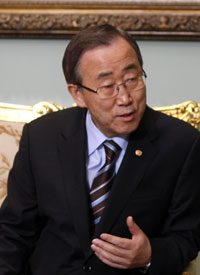
Upon his arrival in Cairo, Ban met with Egyptian President Hosni Mubarak and Spanish Foreign Minister Miguel Angel Moratinos. During a press conference immediately following the meeting, VOANews.com reported that Ban emphasized that many lives have been lost in the Gaza conflict and that a cease-fire must be arranged "immediately," with the details being worked out later. "I have been urging in the strongest possible terms: all sides must stop fighting now. We do not have any time to lose. Then we can discuss and elaborate terms and conditions," he continued. "How to make the truce last, sustainable and durable, and which can be inspected by all the parties."
Ban urged the international community to support a Franco-Egyptian peace plan that calls for an incremental cease-fire. "[The] International community must encourage and fully rally behind this initiative, now," he said.
Ban also stated at the January 14 press conference: "All the member states of the United Nations have obligations to abide by the Security Council resolution. Security Council resolutions are binding in its nature and I urge when I meet with Israeli leaders, as I have been doing until now, to abide by this by immediately halting military operations, ensuring a ceasefire, and engaging humanitarian assistance." (Emphasis added.) In making this statement, Ban made clear that he views the UN not as a forum for discussion and debate among the world’s governments — the way the UN often is portrayed — but as a developing global government.
The secretary-general’s visit to Egypt came just a day after the UN Security Council gave Ban strong support for implementation of Security Council Resolution 1860, passed a week earlier, which calls for an immediate cease-fire. The resolution has been ignored both by Israel and Hamas.
UN spokeswoman Michele Montas was quoted by the French Press Agency (AFP) as stating that Ban’s goal during his tour was "to step up the pace of joint diplomatic efforts regarding Gaza and southern Israel" and that Ban has renewed his call for an immediate cease-fire and for humanitarian aid to be delivered to the Gaza population without restrictions.
AFP reports that after visiting Egypt, Ban is due to fly to Jordan, Israel, the West Bank city of Ramallah, Turkey, Syria, Lebanon, and Kuwait, where he will attend an Arab League summit on January 19.
An article about the Ban trip by Kaveh L Afrasiabi, Ph.D. for the Hong Kong-based Asia Times online for January 15 carried the pessimistic headline "A mission impossible for Ban Ki-moon." Dr. Afrasiabi opined: "In light of Israel’s deep military incursion inside Gaza and Israel’s rejection of the UN demand as ‘unworkable,’ Ban’s ability to achieve his peace objective may be a hope against hope."
While conceding that "it would be premature to brand Ban’s tour as doomed to failure," Afrasiabi stated that "the longer this war drags on and the Israeli army advances deeper into ‘Hamas territory,’ the harder it will be to achieve a ceasefire and disengagement of forces."
Afrasiabi (whose opinions seem to be well-regarded by the U.S. establishment, since he has been the subject of an interviewed published by the Council on Foreign Relations), quoted "a high-ranking UN official" who spoke to him "on the condition of anonymity," as saying: "The [secretary-general] is deeply disappointed that Israel has ignored the Security Council’s mandatory call for an instant cease-fire. But he also knows that he has a strong mandate from the international community when he meets with leaders in Israel and the Arab world."
Afrasiabi observed that "Israel is not thrilled about the prospect of a UN force at the Israel-Gaza border that could, in effect, act as a buffer that could tie Israel’s hands vis-a-vis Hamas in the future. It simply wants one at the Egyptian border to monitor cross-border transactions both on and under the ground, given the wealth of tunnels dug by Hamas over the past couple of years."
He suggested, instead: "An all-inclusive international monitoring of all Gaza’s borders may be a better solution, one that would simultaneously address Israel’s concerns about arms flows into Gaza as well as Hamas’ concerns for unfettered access to goods from the Israeli side."
Afrasiabi’s call for international monitoring (which, by its nature, would require an international force) coincides with a recent proposal made by Martin Indyk, the former U.S. ambassador to Israel who is expected to become Secretary of State-designate Hillary Clinton’s special envoy to the Middle East. Indyk recently stated:
Ultimately, if the ineffectual Qassam rockets that continue to fall on Israeli towns and kibbutzim become more deadly, that job [dismantling Hamas in Gaza] may well have to be done by the Israeli Defense Forces. But once the job is accomplished, with high casualties on both sides, Israel will not want to stay one minute more than necessary. That is when an international force will be essential to help Abbas, as the democratically elected president of the Palestinian Authority, retake control there.
And, in a paper Indyk recently co-published with Council on Foreign Relations President Richard Haass, entitled "Beyond Iraq: A New US Strategy for the Middle East," the two political insiders proposed a new strategy for President-elect Barrack Obama: "The new president should lay the groundwork for deploying international forces as part of a final-status agreement, to partner with the Palestinian forces until they can police their own territory."
It is possible, with the UN increasingly appearing to be ineffectual, that its role may be supplanted by new coalitions of international forces that, while ostensibly operating independent of UN control, will answer to the same internationalist clique that originally created the UN. It is also possible that the UN could be made more effective under the guise of "reform."
Photo: AP Images



